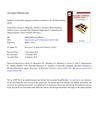 68 citations,
November 2011 in “The American journal of pathology”
68 citations,
November 2011 in “The American journal of pathology” Abnormal Hedgehog signaling in blood cancers may help tumors grow and resist chemotherapy, suggesting potential for targeted treatments.
 December 2024 in “Medical Review”
December 2024 in “Medical Review” Organoids help study and treat genetic diseases, offering personalized medicine and therapy testing.
 January 2025 in “Balkan Medical Journal”
January 2025 in “Balkan Medical Journal” Baricitinib helps regrow hair in severe alopecia areata and is safe, but more research is needed.
 December 2013 in “Biomedical and biopharmaceutical research”
December 2013 in “Biomedical and biopharmaceutical research” Nanotechnology shows promise for better drug delivery and cancer treatment.
13 citations,
January 2020 in “Acta Dermato Venereologica” Ruxolitinib treatment led to unexpected hair regrowth in a patient with alopecia universalis.
 March 2023 in “Revista română de reumatologie”
March 2023 in “Revista română de reumatologie” Skin problems are common in lupus, often appearing first, with various types and treatments, and careful monitoring is important for diagnosis and management.
 August 2023 in “International journal of research in dermatology”
August 2023 in “International journal of research in dermatology” Janus kinase inhibitors are effective and generally safe for treating hair loss in adults with alopecia areata.
 29 citations,
September 2017 in “Oncology and therapy”
29 citations,
September 2017 in “Oncology and therapy” The document provides advice on how to recognize and treat skin-related side effects of cancer drugs known as EGFR inhibitors.
 34 citations,
January 2018 in “International Journal of Dermatology”
34 citations,
January 2018 in “International Journal of Dermatology” Scalp cooling is the most effective FDA-approved method to prevent chemotherapy-induced hair loss, but more research is needed for other treatments.
 25 citations,
May 2018 in “Clinical & Translational Oncology”
25 citations,
May 2018 in “Clinical & Translational Oncology” New melanoma treatments can cause skin side effects, including skin cancer and rashes, but combining treatments may reduce these risks.
 2 citations,
May 2023 in “Photobiomodulation, photomedicine, and laser surgery”
2 citations,
May 2023 in “Photobiomodulation, photomedicine, and laser surgery” Light therapy is effective and safe for treating skin color disorders like vitiligo and dark spots.
 1 citations,
March 2023 in “Clinical, Cosmetic and Investigational Dermatology”
1 citations,
March 2023 in “Clinical, Cosmetic and Investigational Dermatology” Current treatments for Alopecia Areata have mixed success, and there's a need for better, more accessible options and support for affected individuals.
 10 citations,
January 2019 in “Biomarker Insights”
10 citations,
January 2019 in “Biomarker Insights” Scalp cooling to prevent hair loss from chemotherapy works for some but not all, and studying hair damage markers could improve prevention and treatment.
 66 citations,
December 2018 in “Dermatology”
66 citations,
December 2018 in “Dermatology” Both ruxolitinib and tofacitinib are effective and safe for treating severe alopecia areata, but relapses are common.
 10 citations,
July 2022 in “Journal of Medicinal Chemistry”
10 citations,
July 2022 in “Journal of Medicinal Chemistry” Adding a second method to PROTACs could improve cancer treatment.
 2 citations,
August 2023 in “Life”
2 citations,
August 2023 in “Life” Bioinspired polymers are promising for advanced medical treatments and tissue repair.
 8 citations,
May 2023 in “Gels”
8 citations,
May 2023 in “Gels” Chitosan hydrogels are promising for repairing blood vessels but need improvements in strength and compatibility.
 January 2019 in “Medicine Science | International Medical Journal”
January 2019 in “Medicine Science | International Medical Journal” Children with different rheumatologic diseases have specific skin symptoms that can help with diagnosis.
 December 2024 in “Cureus”
December 2024 in “Cureus” Baricitinib treatment for alopecia universalis can cause hair regrowth with unexpected whitening.
 6 citations,
January 2016 in “Bioorganic & Medicinal Chemistry Letters”
6 citations,
January 2016 in “Bioorganic & Medicinal Chemistry Letters” Some minoxidil combinations can help differentiate leukemia cells without harming other cells.
 58 citations,
March 2020 in “Scientific Reports”
58 citations,
March 2020 in “Scientific Reports” EGFR-TKIs can cause significant skin, nail, and organ side effects.
 December 2024 in “World s Veterinary Journal”
December 2024 in “World s Veterinary Journal” Treatment with specific medications and supplements improved skin condition and hair regrowth in an Akita with sebaceous adenitis.
 51 citations,
March 2014 in “Nature Communications”
51 citations,
March 2014 in “Nature Communications” Skin tumor regression is helped by retinoic acid signaling blocking Wnt signaling.
37 citations,
November 2017 in “Medical Sciences” Melanoma's complexity requires personalized treatments due to key genetic mutations and tumor-initiating cells.
 November 2023 in “Frontiers in pharmacology”
November 2023 in “Frontiers in pharmacology” Drug repositioning offers hope for new, affordable treatments for a genetic skin disorder called ARCI.
 June 2023 in “Dermatology and therapy”
June 2023 in “Dermatology and therapy” The Middle East and Africa need better data, treatment consensus, and support for Alopecia Areata.
 February 2024 in “International journal of medical science and clinical research studies”
February 2024 in “International journal of medical science and clinical research studies” CCCA is a scarring hair disorder mainly affecting people of African descent, needing better awareness and treatment.
 6 citations,
May 2023 in “Drugs”
6 citations,
May 2023 in “Drugs” Baricitinib helps regrow hair in adults with severe alopecia better than a placebo and is approved for treatment, but long-term effects are still unknown.
 100 citations,
September 2017 in “Molecular and Cellular Endocrinology”
100 citations,
September 2017 in “Molecular and Cellular Endocrinology” Male hormones and their receptors play a key role in hair loss and skin health, with potential new treatments being explored.
 55 citations,
October 2019 in “Dermatology and therapy”
55 citations,
October 2019 in “Dermatology and therapy” Drugs targeting the JAK/STAT pathway can improve atopic dermatitis but vary in effectiveness for vitiligo and alopecia areata, with generally mild safety concerns.




























